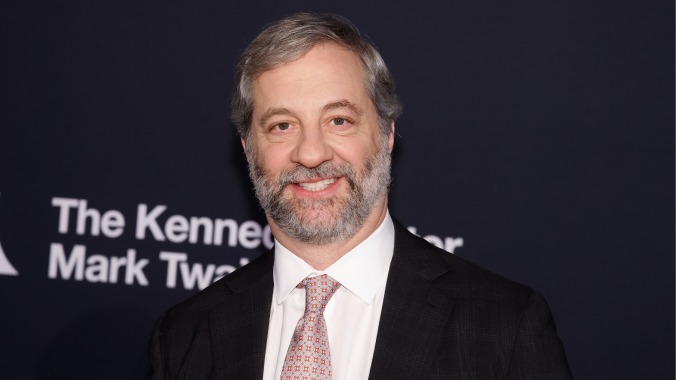Judd Apatow opines studios already have an end date in mind for strike
As the writers union strike gears up for its second week, Judd Apatow has some theories about how (and when) a deal might play out

After almost a week of picketing, the writers’ strike that failed negotiations between the Writers Guild of America (WGA) and the Alliance of Motion Picture and Television Producers (AMPTP) begot is only picking up steam, with countless writers, actors, and show-runners voicing their support for the Guild’s demands.
Among those supporters is Judd Apatow, who recently shared his own thoughts on how exactly the rest of the strike might play out. Despite the (purposeful) industry uncertainty the WGA’s stalwart collective action has created, Apatow says he thinks studios already have a timeline for the strike—and when it might conclude—in mind.
“I think they probably already know what they’re going to bend on,” Apatow said at the Rock4EB benefit in Malibu, reports Variety. “I would assume they already know what date this is going to end. They’ve probably been planning this for years.”
The way Apatow sees it, there are no big twists in store when it comes to this strike; if and when bargaining agreements are reached “it’s always a very obvious position.”
“I always think that whatever happens, they could have figured it out already. When these things conclude, you never go, ‘I understand why it took that long.’ It’s never something so inventive, and groundbreaking, that you think, ‘Oh, people needed to go to war for months over it,’” he said. “So that’s what’s scary about it is that there is a solution but I’m not sure that all of the business interests are interested in getting to it quickly.”
The idea that television writers’ essential contributions don’t line up with studio business interests is a pretty hard pill to swallow, especially given how much money the strike has already cost the industry. These numbers indicate that the AMPTP’s refusal to meet the Guild’s demand has more to do with maintaining consolidated power and high salaries for those at the top of the heap than actually being financially efficient. Conversely, Apatow opines, the WGA’s demands for fairer compensation and sturdier contractual protections have little to do with greed and everything to do with a desire to make writing a feasible profession for anyone without a trust fund.
“We have a system now that does not reward success for a lot of these projects,” Apatow said. “If you make something and a billion people watch it, you don’t make more money than if it was a disaster, right? That’s not good for creativity because it takes away a lot of the motivation for the creative people, because people work really hard to create some sort of cushion for their lives. All of our work is ebb and flow. The successes pay for the time when things aren’t going well. Sometimes they go well and sometimes they don’t, but you can live off of the time that you wrote something that had a lot of residual [fees paid out]. It’s always been a tenuous career. But if you take away most of the linchpins, it’s a career that a majority of people can’t survive.”